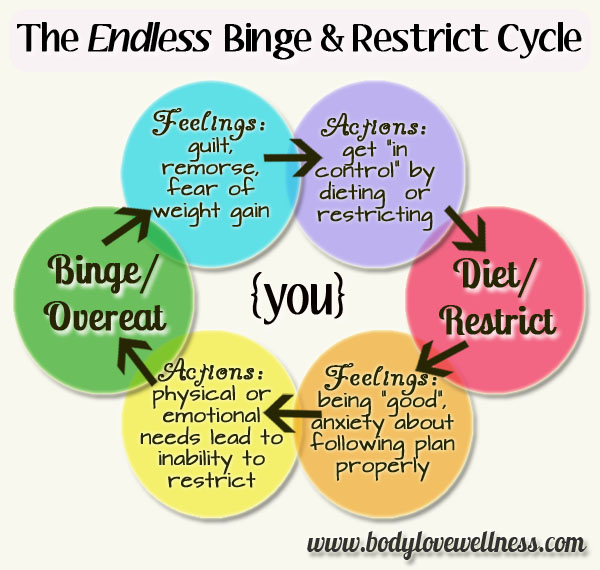
Editor’s Note: This website is not designed to, and should not be construed to, provide medical advice, professional diagnosis, opinion or treatment to you or any other individual, and is not intended as a substitute for medical or professional care and treatment. For serious.
~
Why Most Diets Fail.
The reason diets backfire almost all the time is because we restrict too much.
When we dramatically reduce our caloric count, our body instantly perceives danger and turns on the alarm system that protects us from starvation and slows our metabolism. We go into starvation mode and just start eating and eating once we inevitably stop the diet—the classic rebound weight gain.
Imagine what happens when we skip breakfast, work through lunch and finally return home in the evening. We eat everything in sight, right? We subsequently feel stuffed, sick and guilty and regret ever entering the kitchen in the first place.
Why would we want to overeat and make ourselves sick? After all, we are reasonable people and know we shouldn’t overeat.
The truth is we are neither weak-willed, morally corrupt nor self-destructive. We don’t need years of therapy to overcome this problem.
The answer lies within our genetic programming. We are built to put on weight, and our bodies don’t like it when we don’t give them the calories they need.
We all know overweight people who say, “I don’t really eat that much, and I still can’t lose weight.” Their diet usually fails, and they usually regain that weight as fat. Constantly dieting means our bodies have been through this process a number of times.
I often hear that the obesity epidemic is a matter of personal responsibility. I hear that people should exercise more self-control, avoid overeating and reduce their intake of sugar-sweetened drinks and processed food.
Science suggests otherwise: Processed, sugar-, fat-, and salt-laden foods—food that is made in a plant rather than grown on a plant—are biologically addictive.
Almost nobody sits down and eats four bowls of broccoli, but many of us could polish off four bowls of ice cream. There are specific biological mechanisms that drive such addictive, never-satisfied behavior.
These behaviors arise from primitive neurochemical reward centers in the brain that override normal willpower and, in the case of food addictions, overwhelm the ordinary biological signals that control hunger.
The bottom line is that nobody chooses to be fat. Instead, we are biologically wired to crave sugary, processed foods and eat as much of them as possible.
7 Strategies to Stop Overeating and Lose Weight
Fortunately, some easy-to-implement strategies can help us normalize our eating, so we neither overeat nor under-eat. Thankfully, none of them involve counting calories. Among the strategies that have helped thousands of my clients lose weight, keep it off and reduce risk for diabesity include:
- Cut out the processed stuff and eat real, whole foods. The single most important thing to lose weight and avoid overeating is to include as many real, whole unprocessed foods in our diet as possible. Make a switch to whole, real unprocessed foods such as vegetables, fruits, whole grains, beans, nuts, seeds, olive oil, organic, range or grass-fed animal products (poultry, lamb, beef, pork, eggs) and wild, smaller fish such as salmon.
- Eat breakfast. Skipping breakfast means we eventually feel famished, and throughout the day we eat much more food than we need to feel full. A recent study found that almost 3,000 people who lost an average of 70 pounds and kept it off for six years ate breakfast regularly. Only four percent of people who never ate breakfast kept the weight off.
- Eat mindfully. We need to be in a relaxed state for the nervous system of our gut or digestive system to work properly. Eating while we are stressed out makes us fat, both because we don’t digest our food properly and because stress hormones slow metabolism and promote fat storage, especially of belly fat. We also tend to overeat when we eat quickly, because it takes the stomach 20 minutes to signal the brain that we are full.
- Keep track of eating habits. Journaling is an excellent way to break mindless eating and other bad habits. A diet of words and self-exploration often results in weight loss. We metabolize our life and calories better.
- Get sufficient sleep. Get eight hours of quality, uninterrupted sleep every night. We’ll become less prone to cravings and normalize fat-regulating hormones. One study found even a partial night’s sleep deprivation contributes to insulin resistance, paving the way for obesity and Type 2 diabetes.
- Control stress levels. We often fail to notice the effects of the chronic stresses we live with every day: demanding jobs, marital tension, lack of sleep, too much to do and too little time to do it. Chronic stress makes us overeat, not to mention overeating the wrong kinds of food, which ultimately leads to weight gain. Learn to actively relax with de-stressing techniques like meditation, yoga or deep breathing.
- Exercise. The right exercise helps us lose weight, maintain weight loss and control our appetite so we don’t overeat. Ideally we should aim for at least 30 minutes of walking every day. We often require more vigorous and sustained exercise to reverse severe diabesity. Run, bike, dance, play games, jump on a trampoline or do whatever feels fun.
What strategy would you add to this list to avoid overeating, maintain a healthy weight, and finally get off the diet roller coaster? Share yours below or on my Facebook page.
~
References
Donga E, et al. A single night of partial sleep deprivation induces insulin resistance in multiple metabolic pathways in healthy subjects. J Clin Endocrinol Metab. 2010 Jun;95(6):2963-8.
Farshchi HR, et al. Deleterious effects of omitting breakfast on insulin sensitivity and fasting lipid profiles in healthy lean women. Am J Clin Nutr . 2005 Feb; 81(2): 388– 396.
Gershon M. The second brain: A groundbreaking new understanding of nervous disorders of the stomach and intestine, Perennial. 1999.
David M. The Slow Down Diet: Eating for Pleasure, Energy and Weight Loss. Healing Arts Press, 2005.
~
Author: Mark Hyman
Editor: Rachel Nussbaum
Photo: Body Love Wellness






Read 1 comment and reply